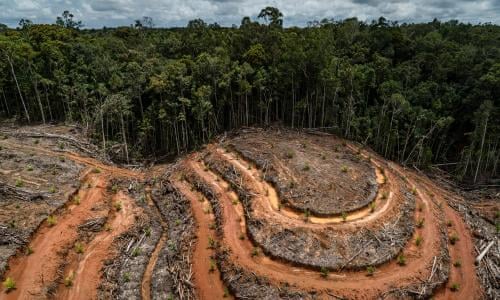The Industry that Immensely Affects Our Planet

The meat industry has caused the rapid deforestation of rainforests across the world
Awareness surrounding climate change has dramatically increased – several people seeking out solutions to improve our planet. However, most of the time, that ‘awareness’ doesn’t follow us home to our dinner plates. Here’s what you need to know about animal agriculture and how the industry has been impacting the environment.
Animal agriculture is the second-largest contributor to human-made greenhouse gases.
With fossil fuels being first, animal agriculture is accountable for more greenhouse gases than all transportation systems. As stated by the UN Food and Agricultural Organization (FAO), animal agriculture emits 7.1 gigatonnes of CO2 a year. One gigaton is about 400,000 Olympic swimming pools – far too much emitted into the atmosphere.
Animal agriculture links to almost a third of biodiversity loss.
Animal agriculture requires a considerable amount of resources, greatly hindering the planet’s quantity of land, energy, and water. As maintained by Rain Tree, livestock uses 1-2 acres of rainforest per second – one acre being approximately sixteen tennis courts. Combined with that, animal agriculture needs nearly sixteen percent of global freshwater, according to Climate Nexus. With the growing demand for meat, those numbers will continue to grow – further increasing the percentage of biodiversity loss.
The rate of meat production is growing faster than the speed of population growth.
According to People for the Ethical Treatment of Animals (PETA), it takes more than 2,400 gallons of water to produce only one pound of beef. With Asia, Europe, and North America being the top consumers of meat (approximately 238.52 million tons per year, according to FAO), the demand is higher than ever before, using a significant amount of natural resources.
Unquestionably, a person’s habits can’t change overnight. Nevertheless, earth is still being affected by animal agriculture. Reducing your meat intake – even if it’s in small amounts – can greatly influence the meat industry and its detrimental effect on the planet. If there’s a chance to reverse our impact on the planet, then why not?

EMAIL: [email protected]
Aloha! My name is Gisele Bisch, and I'm from the North Shore. Now a senior this year, I am delighted to say that this is my second year of being a staff member in Ka Mō'ī! I have a profound interest in sustainability, nutrition, drawing and painting, and social justice. As a staff member of Ka Mō'ī, I am fortunate to be able to utilize my student-voice and participate in discussions regarding these and other issues.

